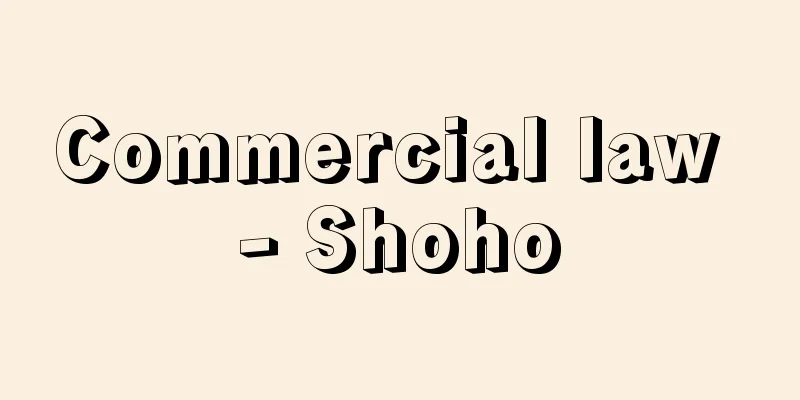Commercial law - Shoho

The Significance of Commercial Law[1] Formal meaning and substantive meaningWhen the term commercial law is used in the sense of commercial law as a legal law, rather than as a method of doing business, it can refer to either the law (legal code) that exists under the name commercial law, or the field of law that can be theoretically understood under the name commercial law. The former is called commercial law in a formal sense, and refers to the Commercial Code (Law No. 48 of 1899) that is included in the Roppo Zensho, while the latter is called commercial law in a practical sense, and refers to the totality of laws that were created to regulate the life relationships specific to companies. [Shuzo Toda and Norihiko Fukuhara, June 21, 2021] [2] Commercial Law as Corporate LawThe clue to understanding the uniqueness of a legal field lies in the facts of life that the field covers. The "commerce" that commercial law covers in its practical sense originally meant the economic one, that is, the act of mediating the conversion and distribution of goods between producers and consumers. However, in modern society, the scope of commercial law has expanded to include not only economic businesses, but also auxiliary businesses such as transport, banking, and insurance, manufacturing and processing businesses such as dry cleaning, tailoring, and dyeing, market businesses (hotels, movie theaters, restaurants, game centers, etc.), and even some primitive industries such as agriculture and fishing, through the concept of fictitious merchants. As a result, commercial law today is understood to cover the economic entity known as the enterprise itself, and to be the totality of legal rules that regulate the order of the enterprise's life and activities. This way of thinking is called the enterprise law theory. Here, an enterprise is an independent economic entity that realizes profit-making activities with continuous intention according to a certain plan based on capital calculation. [Shuzo Toda and Norihiko Fukuhara, June 21, 2021] Status of commercial law (enterprise law)[1] Commercial Law in the Modern Civil Law SystemIn modern civil society, which is considered to be the prototype of the society in which we live, law refers to social norms that are enforced and guaranteed to be realized by the power of the state, and law plays a role in forming and maintaining the order of civil society. The law of modern civil society (modern civil law) is mainly divided into three fields: public law, criminal law, and civil law, and these fields of law have different basic concepts and techniques (especially enforcement as the force that realizes the rules of law in society). Commercial law (enterprise law) belongs to the field of civil law and is positioned as a special law of civil law as a substantive law. The characteristics common to civil law that commercial law (enterprise law) are, first, that it forms social order by establishing legal relationships between "people" and "people" in terms of "rights," "obligations," and "responsibilities" based on the principle of private autonomy, and second, that the realization of the contents stipulated in the law is not through coercion by administrative or criminal power, but through each individual's assertion of rights and filing civil lawsuits when necessary, so that private individuals play a large role. [Shuzo Toda and Norihiko Fukuhara, June 21, 2021] [2] Relationship with other fields of law(1) Relationship with the Civil Code The Commercial Code is a special law to the Civil Code, which is a general law. The Commercial Code exists as a special law to amend and supplement the Civil Code, which is a general law and cannot meet the needs of business relationships. (2) Relationship with Labor Law Human elements who assist the activities of a company (corporate assistants) are employed by the company and provide labor, and they hold a certain position in a business relationship to assist the company's external business activities. In the legal field of labor law, legal rules are established for the former situation from the perspective of protecting the living interests of workers, while in the legal field of commercial law, legal rules are established for the latter situation from the perspective of balancing the interests of the parties involved. (3) Relationship with Economic Law Commercial law is a field of law that aims to adjust the mutual interests of individual economic entities based on their interests, and regulates what is called horizontal relationships. In this respect, it differs from economic law (such as the Antimonopoly Act), which aims to achieve overall harmony that goes beyond the interests of individual economic entities based on the interests of the national economy, and regulates what is called vertical relationships. (4) Relationship with Consumer Law Consumer law and commercial law, which are legal fields that focus on consumers as economic entities, are similar in that they both regulate legal relations between companies and consumers (BtoC: Business to Consumer). The field of consumer law differs from commercial law in that it regulates legal relations between companies and consumers based on the principles of consumer protection and independence, premised on the attributes and socio-economic roles of consumers as economic entities. [Shuzo Toda and Norihiko Fukuhara, June 21, 2021] The principles and characteristics of commercial law (corporate law)The activities of economic entities known as companies have technical characteristics such as profitability, collective mass, repetitive continuity, speed, regularity, and linkage, and the legal field known as commercial law (enterprise law) reflects the special characteristics of these corporate life relationships. This can be observed by dividing it into aspects related to corporate organization and aspects related to corporate transaction activities. The aspect related to corporate organization is based on the idea (value) of maintaining and strengthening the company, while the aspect related to corporate transaction activities is based on the idea (value) of facilitating corporate transactions, and each of these produces distinctive legal rules in commercial law (enterprise law). [Shuzo Toda and Norihiko Fukuhara, June 21, 2021] Sources of commercial law (corporate law)A source of law refers to the form in which legal norms exist that specifically recognize a certain legal field. The sources of commercial law include the Commercial Code, special commercial laws, commercial treaties, commercial customs/commercial customs law, and commercial autonomy laws (such as articles of incorporation and business regulations of exchanges). There is some debate as to the source of law for ordinary trade terms and conditions. Commercial law is a field of law that is centered on the rules of civil de facto law, but in addition to substantive law, rules of procedural law and in addition to civil law, rules of criminal law such as penalties can also be found. Therefore, the general view is that, as long as the purpose is to adjust the interests of economic entities involved in corporate relations, these rules should also be understood as being included in the field of commercial law. [Shuzo Toda and Norihiko Fukuhara, June 21, 2021] The content of the Commercial Code in a formal senseThe rules contained in the law known as the Commercial Code (the Commercial Code) are complex and wide-ranging. The Commercial Code, in its first section, General Provisions, sets out the systems for merchants, commercial registration, trade names, commercial books, commercial employees, and commercial agents, following the general rules. In the second section, Commercial Acts, in addition to the general rules for commercial acts, there are provisions on special contracts under the Commercial Code, such as mutual accounts and anonymous partnerships, as well as regulations on the traditional businesses of brokerage, wholesale, freight handling, transportation, forage, and warehousing, and on the types of business transactions. In the third section, Maritime, there are provisions on ships, shipowners, and captains as organizations related to maritime businesses, maritime transport, which is the core of maritime business transactions, as well as provisions on general average, salvage, collision, and marine insurance as measures against maritime dangers, and provisions on ship financing. [Shuzo Toda and Norihiko Fukuhara, June 21, 2021] History of the establishment and amendment of the Commercial CodeJapan's first modern commercial code was enacted in 1890 (Meiji 23) based on a draft by German jurist and economist Roessler. A new commercial code was then enacted in 1899, modelled on the German Commercial Code of 1861, and this new code has undergone numerous revisions to the present day. In 1911 (Meiji 44), a major revision was made, mainly to the company section of the Commercial Code. Following the establishment of the Bills of Exchange Convention in 1930 (Showa 5) and the Cheques Act Convention in 1931, the Bills of Exchange Act (Act No. 20, 1932) and the Cheques Act (Act No. 57, 1933) were enacted, and the bills section of the Commercial Code was abolished. In 1938, the general provisions and company sections of the Commercial Code were significantly revised, and at the same time the Limited Liability Company Act (Act No. 74, 1938) was enacted. After World War II, in 1950, a groundbreaking revision was made to Part 2 of the Commercial Code (Companies Act), particularly the law governing joint-stock companies, followed by a series of revisions to the Companies Act and special laws (1955, 1962, 1966, 1974, 1981, 1990, 1993, 1994, 1997, 1999, 2000, 2001, 2002, 2003, 2004). In 2005, Part 2 of the Commercial Code (Companies), the Act on Special Provisions of the Commercial Code Concerning Audits, etc. of Joint Stock Companies (Special Commercial Code Act), and the Limited Liability Company Act were merged to form the Companies Act (Act No. 86 of 2005), a comprehensive code consisting of 979 articles. The Commercial Code was also amended by the Act on the Adjustment of Related Laws Accompanying the Enforcement of the Companies Act (Act No. 87 of 2005), and the structure of the Commercial Code was changed to Part 1 General Provisions, Part 2 Commercial Transactions, and Part 3 Maritime Transactions. In 2008, the Insurance Act (Act No. 56 of 2008) was enacted and promulgated, deleting the insurance provisions set out in Chapter 10 of Part 2 (Commercial Activities) of the Commercial Code. The provisions of the Commercial Code, Part 2 (Commercial Activities) have undergone very few revisions since the New Commercial Code was enacted in 1899, compared to the provisions of the General Provisions and Company Provisions of the Commercial Code. However, the 2018 revisions included revisions to the overall transportation legislation, such as the establishment of general regulations for various types of transportation, the sender's obligation to notify of dangerous goods, the rights of the consignee, extinguishment of the carrier's liability, the relationship between contractual liability and tort liability, the establishment of regulations for combined transportation, and a review of regulations for passenger transportation, and also revisions were made to Part 3 (Maritime Commercial Activities). In addition, because the provisions of Part 2 of the Commercial Code (Commercial Transactions) are positioned as special laws of the Civil Code, the statute of limitations, statutory interest rates, and securities systems were absorbed into the Civil Code and deleted following the revision of the Civil Code (obligations) in 2017. This trend in revisions of the Civil Code and Commercial Code can be seen as a commercialization phenomenon of the Civil Code during the Heisei era. [Shuzo Toda and Norihiko Fukuhara, June 21, 2021] "Outline of Commercial Law I" by Toda Shuzo, revised edition (1970, Nagundo Miyamasha)" ▽ "Commercial Law I - General Provisions and Commercial Transactions" by Ochiai Seiichi, Otsuka Ryuji, and Yamashita Tomonobu, 6th edition (2019, Yuhikaku)" ▽ "Corporate Law General Principles and General Provisions - Commercial Law (General Principles and General Provisions) and General Provisions of the Company Law, etc." by Fukuhara Norihiko, 2nd edition (2020, Bunshindo)" ▽ "Corporate Law Essentials 2: Corporate Transactions Law - Commercial Law (Commercial Transactions and Maritime Transactions) and Insurance Law/Financial Transactions, Consumer Transactions, and Electronic Commerce and Law" by Fukuhara Norihiko, 2nd edition (2021, Bunshindo)" [References] | | | | | | Law| |Source: Shogakukan Encyclopedia Nipponica About Encyclopedia Nipponica Information | Legend |
商法の意義〔1〕形式的意義と実質的意義商法ということばを、商売の方法という意味ではなく、法律の法としての商法の意味で用いる場合には、商法という名前で存在する法律(法典)をさす場合と、商法という呼び名で理論的に把握できる法分野をさす場合とがある。前者を形式的意義における商法といい、六法全書に掲載されている商法典(明治32年法律第48号)をさし、後者を実質的意義における商法といい、企業に特有な生活関係を規律するために形成された法の総体のことを意味する。 [戸田修三・福原紀彦 2021年6月21日] 〔2〕企業法としての商法法分野の独自性を理解する手掛りは、その法分野が対象とする生活事実にある。実質的意義における商法が対象としている「商」は、もともと経済的意義における商、すなわち生産者と消費者の間に介在して、財貨の転換流通を媒介する行為を意味していた。しかし、近代社会における商法では、その対象が拡大され、経済上の商のほか、運送・銀行・保険のような補助商、クリーニング業・洋服の仕立屋・染色業のような製造・加工業、場屋(じょうおく)営業(ホテル、映画館、レストラン、ゲームセンターなど)から、さらに、擬制商人という概念を媒介として、農業・漁業などの原始産業の一部にまでその対象が及んだ。その結果、今日では、商法は、企業という経済主体そのものを対象とし、その生活・活動の秩序を規律する法的ルールの総体であると理解されるようになった。この考え方を企業法説という。ここに企業とは、資本的計算のもとに、一定の計画に従い継続的な意図をもって営利行為を実現する独立の経済主体である。 [戸田修三・福原紀彦 2021年6月21日] 商法(企業法)の地位〔1〕近代市民法の体系における商法私たちが生活する社会の原型とされる近代市民社会において、法とは国家の権力によって強制され実現が保障される社会規範をいい、法は市民社会秩序を形成し維持する役割を果たしている。近代市民社会の法(近代市民法)には、おもに、公法、刑事法、民事法という三つの分野があり、それらの法分野では、基本的な概念や技術(とくに法というルールを社会で実現する力としてのエンフォースメント)が異なっている。商法(企業法)は、民事法の分野に属し、実体法として民法の特別法という位置づけにある。商法(企業法)にも備わっている民事法共通の特質としては、第一に、私的自治の原則をベースとして、「人」と「人」との「権利」「義務」「責任」の法律関係を設定して社会の秩序を形成していることにあり、第二に、法で定められた内容の実現が、行政や刑罰の力による強制を通じてではなく、ひとりひとりが権利を主張したり必要に応じて民事の裁判を起こしたりすることを通じて行われるというように、私人の果たす役割が大きいということにある。 [戸田修三・福原紀彦 2021年6月21日] 〔2〕他の法分野との関係(1)民法との関係 商法は、一般法である民法に対する特別法という関係にあり、一般法である民法の規定では企業関係の需要を処理できないために、これを変更・補充する特別法として存在する。 (2)労働法との関係 企業の活動を補助する人的な要素(企業補助者)には、企業に雇用されて労務を提供するという場面と、企業の対外的営業活動を補助するために取引関係上一定の地位にたつ場面とがあり、労働法という法分野では、前者の場面を労働者の生活利益の保護の観点から法的ルールを設けているのに対して、商法は、後者の場面を関係者の利益調整の観点から法的ルールを設けて規律している。 (3)経済法との関係 商法は、個々の経済主体の利益を基礎として、これら相互間の利益の調整を図ることを目的とする法分野であり、いわば水平的な関係を規律している。この点において、国民経済の利益を基礎として、個々の経済主体の利益を超える全体的な調和を図ることを目的とする法分野で、いわば垂直的な関係を規制する経済法(たとえば独占禁止法)とは異なる。 (4)消費者法との関係 消費者という経済主体に着目した法分野である消費者法と商法とは、ともに企業と消費者との間(BtoC:Business to Consumer)の法律関係を規律する場面があることで似ている。消費者法の分野には、消費者という経済主体の属性と社会的経済的役割を前提に、消費者の保護と自立を理念として、企業と消費者間の法律関係を規整するという特色がある点で商法と異なっている。 [戸田修三・福原紀彦 2021年6月21日] 商法(企業法)の理念と特色企業という経済主体の活動には、営利性・集団大量性・反覆継続性・迅速性・定型性・連鎖性という技術的な性格があり、商法(企業法)という法分野は、それら企業生活関係の特殊な性格を反映している。そのことは、企業組織に関する側面と企業取引活動に関する側面とに分けて観察することができる。企業組織に関する側面では、企業の維持強化という理念(価値)に基づき、企業取引活動に関する側面では、企業取引の円滑化という理念(価値)に基づき、それぞれ、商法(企業法)に特色ある法的ルールを生み出している。 [戸田修三・福原紀彦 2021年6月21日] 商法(企業法)の法源法源とは、ある法分野を具体的に認識する法規範の存在形式のことをいう。商法の法源には、商法典、商事特別法令、商事条約、商慣習・商慣習法、商事自治法(定款や取引所の業務規程のようなもの)がある。普通取引約款の法源性については議論がある。なお、商法は、民事実体法のルールを中心とする法分野であるが、実体法に加えて訴訟法のルールや、民事法に加えて罰則などの刑事法のルールも散見される。そこで、企業関係に関与する経済主体の利益の調整を目的とする限り、それらのルールも商法の分野に含めて理解するのが一般的な見解である。 [戸田修三・福原紀彦 2021年6月21日] 形式的意義の商法(商法典)の内容商法という名の法律(商法典)に含まれるルールの内容は、複雑で多岐にわたっている。商法典は、第1編総則では、通則に続いて、商人、商業登記、商号、商業帳簿、商業使用人、代理商などの制度を定め、第2編商行為では、商行為の通則的規定のほか、交互計算、匿名組合など商法上の特殊契約に関する規定を置き、さらに、伝統的な各種の営業である仲立・問屋(といや)・運送取扱・運送・場屋・倉庫の各営業と企業取引の類型に関する規律を定め、そして第3編海商では、海上企業に関する組織としての船舶・船舶所有者・船長や、海上企業取引の中心をなす海上運送のほか、海上危険への対応策としての共同海損・海難救助・船舶衝突・海上保険に関する規定や、船舶金融に関する規定を置いている。 [戸田修三・福原紀彦 2021年6月21日] 商法典の制定と改正の経緯日本で最初の近代的な商法典は、ドイツの法学者・経済学者ロエスレルの草案に基づき1890年(明治23)に制定された。その後、ドイツ1861年商法典を模範として1899年に新たな商法典が制定され、この新商法典がたびたびの改正を経て、今日に至っている。1911年(明治44)には、商法会社編を中心に大改正がなされた。1930年(昭和5)の手形法条約および1931年の小切手法条約の成立を受けて、「手形法」(昭和7年法律第20号)および「小切手法」(昭和8年法律第57号)が制定されて、商法典中にあった手形編は廃止された。1938年には商法典の総則編と会社編の大改正がなされ、同時に「有限会社法」(昭和13年法律第74号)が制定された。 第二次世界大戦後、1950年(昭和25)には、商法第2編(会社編)、とくに株式会社に関する画期的な改正が行われ、その後、会社編と特別法の改正が相次いだ(1955年、1962年、1966年、1974年、1981年、1990年、1993年、1994年、1997年、1999年、2000年、2001年、2002年、2003年、2004年)。 2005年(平成17)には、商法第2編(会社編)、「株式会社の監査等に関する商法の特例に関する法律」(商法特例法)および「有限会社法」を統合して、全979条からなる大法典の「会社法」(平成17年法律第86号)が成立し、「会社法の施行に伴う関係法律の整備等に関する法律」(平成17年法律第87号)によって、商法典も改正され、商法典の構成は、第1編総則、第2編商行為、第3編海商と改められた。 2008年には、「保険法」(平成20年法律第56号)が制定・公布され、商法第2編(商行為編)に第10章として定められていた保険の諸規定が削除された。 商法第2編(商行為編)の諸規定は、1899年に新商法が制定されて以来、商法の総則編や会社編に関する諸規定と比べると、改正がきわめて少なかった。しかし、2018年の改正では、各種運送についての総則的規律の新設、荷送人の危険物に関する通知義務、荷受人の権利、運送人の責任の消滅、契約責任と不法行為責任との関係、複合運送に関する規律の新設、旅客運送に関する規律の見直し等の運送法制全般に関する改正が行われ、第3編(海商編)の改正も行われた。 また、商法第2編(商行為編)の諸規定は、民法の特別法としての位置づけにあることから、2017年の民法(債権関係)改正の影響を受けて、時効制度・法定利率・有価証券の制度が、民法に吸収される形で削除された。この民法・商法の改正の動向は、平成における民法の商化現象とみることができる。 [戸田修三・福原紀彦 2021年6月21日] 『戸田修三著『概説商法Ⅰ』改訂版(1970・南雲堂深山社)』▽『落合誠一・大塚龍児・山下友信著『商法Ⅰ――総則・商行為』第6版(2019・有斐閣)』▽『福原紀彦著『企業法総論・総則――商法(総論・総則)・会社法総則等』第2版(2020・文眞堂)』▽『福原紀彦著『企業法要綱2 企業取引法――商法(商行為・海商)・保険法/金融取引・消費者取引・電子商取引と法』第2版(2021・文眞堂)』 [参照項目] | | | | | | | |出典 小学館 日本大百科全書(ニッポニカ)日本大百科全書(ニッポニカ)について 情報 | 凡例 |
<<: Shoho (English spelling) chao fǎ
>>: Purification valve - Joben
Recommend
Swadesh, M.
Following this example, in Japan, English scholar...
Phtheirospermum japonicum (Thunb.) Kanitz
A semi-parasitic annual plant of the Scrophulariac...
Pylōn (English spelling) pylon
...The above-ground temples, which were often bui...
Pinus pinea (English spelling)
… [Makoto Nishida]. … *Some of the terminology th...
Omiya marshalling yard
...During the Edo period, it was a post town on t...
School Camp - Gakkou Kampu
…School facilities established at the foot of mou...
Mutama River
[1] A general term for the six Tamagawa areas of I...
Domaru - Domaru
A style of Japanese armor. As opposed to o-yoroi,...
Verny, FL (English spelling) VernyFL
... Bellecourt's successor, L. Roche, had lon...
Kapingamarangi Island (English spelling)
An atoll in the Pacific Ocean, located slightly no...
Kazasukeru - Kazasukeru
In this respect, they were different from the ula...
Kęstutis (English spelling)
1297‐1382 Grand Duke of Lithuania. Reigned 1381-82...
Oil layer - Yuso
An underground reservoir that contains crude oil....
Red Stick
Among the koi of the "red and white" var...
aoidē (English spelling) aoide
…It is a genre of poetry generally understood tod...









